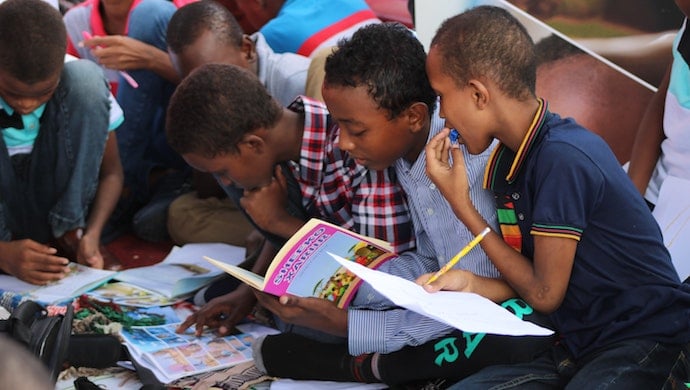
Travelling across India as a child with my father to visit his textile factories, I spent a considerable amount of time with my peers in rural villages. What was clear to me, even then, was how talented these children were. Yet how few decent educational options were available to them.
The same can be said for Southeast Asia, which I now call home. The region has a population of 700 million, of which 26 per cent are of a school-attending age. However, literacy rates are as low as 58 per cent in Laos, 74 per cent in Cambodia and 76 per cent in Myanmar.
Southeast Asia’s large rural population can be partly attributed to this educational gap, while the lack of appropriate infrastructure, adequately trained teachers and funding also plays a role.
Despite Southeast Asia’s relatively low literacy levels, the region boasts a high internet penetration rate with 400 million people accessing the internet and an increasingly tech-savvy population, particularly amongst the younger generation.
The combination of a need for more accessible, quality education and recent digitisation create fertile ground for the edutech sector to flourish. There is a significant untapped opportunity for e-learning products and services to deliver quality learning programmes to traditionally underserved communities. This potential is gradually being realised with US$480 million in venture capital funding allocated to Southeast Asian edutech startups in the last five years– consisting of 200 individual investments.
With a keen interest in making education as accessible as possible, especially in the foundational years, I launched Creative Galileo in July 2020, amidst COVID-19 pandemic. Creative Galileo is an e-learning app that melds education and entertainment to provide personalised learning experiences for children from three to eight years of age.
Our aim is to leverage technology to place an emphasis on personalised needs, inquiry-based learning methods and experiential activities, resulting in a fun, interactive curriculum.
Technology is key to democratising access to education
For me, technology is the key factor in democratising access to education – an urgent priority in the developing world and beyond. As Asia’s digital economy continues to accelerate, driving digital inclusion, particularly in the region’s underserved communities, must be at the forefront of social development strategies.
To this end, edutech solutions can narrow literacy divides and pave the way for more inclusive educational systems by providing better access to higher-quality teachers for all kinds of students, improving efficiency and flexibility in the deployment of learning programmes and lowering the costs of traditional in-person teaching.
In terms of accessibility, edutech has a huge role to play in ensuring no one is left behind in the shift to digital. For a start, many e-learning apps are available completely free of charge, sometimes with in-app optional purchases for those who can afford them.
Secondly, as the edutech sector grows we are seeing an increasing number of languages, both those widely spoken as well as more local dialects, being made available, further democratising educational opportunities. Lastly, for students with data use and internet connectivity limitations, players in the edutech sector must make it a priority to keep their app size below a certain threshold to ensure education remains accessible for all students.
Technology is also enabling the personalisation and gamification of learning, providing a more immersive, impactful experience for children. For example, digital tools have made it possible for parents to receive real-time updates on their child’s progress, while children can be prompted to take revision modules in areas where improvement is needed.
At Creative Galileo, we deliver our interactive online lessons through storylines of Little Singham and his friends, much loved animated characters in the Indian subcontinent. While ‘edutainment’ shows such as Dora the Explorer and Sesame Street is well established internationally, there is a ripe opportunity to replicate this in developing markets, particularly within the Asian region.
Edtech: A trend here to stay
Nearly 1.6 billion students across 200 countries were affected by school closures at the peak of COVID-19, resulting in a sharp increase in the adoption of edutech solutions.
Installations of the five top edutech apps in Southeast Asia grew more than three-fold from six million in 2019 to 20 million in 2020. I believe this trend is very much here to stay, even beyond the pandemic we should expect a blend of offline and online learning to be the norm.
Also Read: Edutech in SEA is still “far behind compared to North America” – but there is some hope
Further demonstrating the longevity of edutech solutions is their marked success in large countries such as India, where there is a shortage of teachers, and Indonesia. With the world’s fourth-largest education system, but also one of the lowest-performing, Indonesia has an increasingly thriving edutech ecosystem.
E-learning solutions are helping to overcome the archipelago’s geographical challenges –which have hindered inclusive access to physical learning spaces– and tapping directly into the digitally engaged younger generation.
While digitalisation has already transformed many key industries, including retail, finance and insurance, we have yet to see the full potential of edutech. Digital tools will play a crucial role in delivering personalised, meaningful education for the next generation while helping to address urgent developmental needs, particularly in developing countries.
I am excited to see what the future holds for edutech in Southeast Asia and look forward to continuing to create a more inclusive education system through e-learning solutions.
–
Editor’s note: e27 aims to foster thought leadership by publishing contributions from the community. This season we are seeking op-eds, analysis and articles on food tech and sustainability. Share your opinion and earn a byline by submitting a post.
Join our e27 Telegram group, FB community or like the e27 Facebook page
Image credit: Ismail Salad Hajji dirir on Unsplash
The post Edutech in SEA is ripe for acceleration. This is why they can help build a more inclusive society appeared first on e27.

